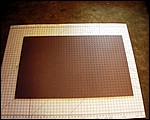 |
I acquired a 1/4" thick perforated board, measuring 40"x26" as the picture
shows I use the rough side to work on, leaving the nice side for the gluing
of the upholstery on it.
|
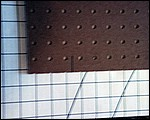 |
placing the board in the trunk I marked where the "notched" are going to
be lining up for the cross supporting bar will land with a marker.
|
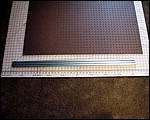 |
Here we sheet the board with the "poles" that will be
supporting the platform, they are 40.5" wide
|
 |
close up of the tubing, the material I used was galvanized light steel
(usually found as electrical wire pass tubing)
|
 |
lining the pole across the board on the marks made
shows what it will be when this is done, and permits to "trim" the pipes if
required to sizes.
|
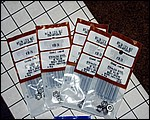 |
The nuts I will be using are #10-24 with nylon inserts, why ? because
of the nylon insert in the nut it will prevent vibrations to loosen the nuts
out from position.
|
 |
The bolts I use are 10-24# by 5/8" long beveled heads
so that they will fade slightly into the holes we will drill into the board,
leaving not "bumps" on the board once the carpeting is glued on.
|
 |
the U shape clamps witch will hold the pipes to the board are in the
pluming section, PVC 1/2" diameter clamps.
|
 |
This picture the final product of the hardware
assembled, below how to get there!
|
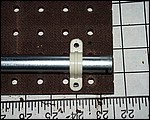 |
lay your pipe at the mark you made earlier, lay down one of the clamp,
and mark the holes with a marker on the board (I did not use the
perforations in the actual board because they did not match up to the
clamps) Repeat for all clamps positions (I use 3 location per pole) 1 at
each end and one in the exact middle of the pole for additional support.
|
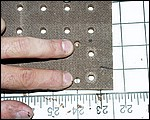 |
Drill the holes, the picture show the holes drilled.
|
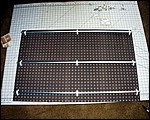 |
Attach the assembly of poles, clamps and hardware to the back of the
board as show by this picture.
|
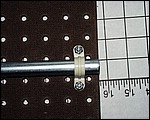 |
Here we have a close up of a clamp finished.
|
 |
My new 6x9" speaker I intend to install (if you prefer other sizes or
dimensions the process remains the same, just will be different according to
what kind/size of speaker you want to install)
|
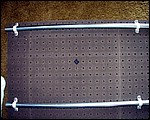 |
I found the center location of the area where I want
to install the speaker (I counted the number of holes width and height wise
from poles and clamps and marked that hole as my center point. repeat as
required.
|
 |
Using the speaker template provided by the manufacturer I center the
template on to the mark I made earlier. I counted the inside holes
horizontally and vertical to center it evenly on to my mark.
|
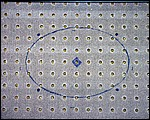 |
Holding the template in place, mark the inner circle
and the screw holes required to mount the speaker on to the board
|
 |
Cut the holes out (I use a Jig-saw to speed the process up) and drill
the screw holes out, then lay your fabric down Good side down, and lay your
paneling assembly on to the backside of the fabric (good side of paneling.)
|
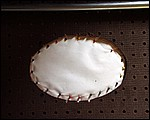 |
Slip a piece of paper to cover the hole you just made
(we are making a mask on the fabric so when we apply the contact glue no
glue will be present on the face of the speaker hole) Then using needles I
pinned it to the fabric. and traced out the inner holes edge with a pen.
|
 |
Repeat this process as required, I also added 4 pins around the board
edges to help me later on
|
 |
close up of a speaker mask on the fabric.
|
 |
cut the inner circle you marked out earlier with scissors, try not to
move the fabric while doing this.
|
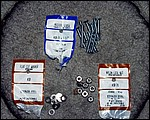 |
Here we have a picture of the hardware I will be
using to mount the speakers on to the board, it is composed of 10-24# 1 1/2"
bolts 10-24# nut with nylon insert (explained reason why earlier) and 10-24#
washers.
|
 |
Now for final assembly.. I used contact glue in a spray can (make works
easier) I sprayed the top surface of the cargo platform without the speakers
being installed, then as the glue slowly sets, I installed the speakers on
to the rear of the paneling (under it) once the speakers where attached to
the board, I sprayed some contact glue all over the fabric, then removed the
paper masks we had pinned on to the fabric (leaving spaces with no glue on
the fabric to face the speakers), then lining up my board with the 4 pins
that I have on the fabric indicating the edges of my board, I gently drop it
on to the fabric and let it sit, as I walk all over it to press it together
(I used a thick cardboard base under the actual fabric to provide additional
support to this endeavor)
|
 |
trim the edges leaving 2-3" all around the panel,
using the contact glue, spray some on the back of the panel and some on the
remaining edges of carpeting and fold under.
|
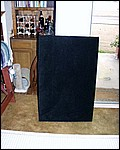 |
Here is the final product.
|
 |
Close up of the board in place driver side.
|
 |
close up of the board in place passenger side.
|
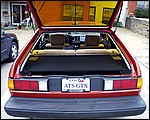 |
Complete view of project, now all you can see, is the
stock 4x6 grills and my 6x9 are hidden under the board. Much less attractive
to thieves eyes, not to mention a cleaner look once again.
|






